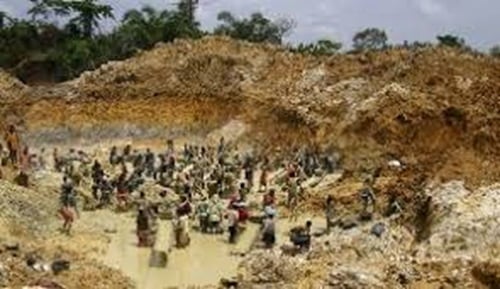The tranquility of Manso-Abodom, a community nestled within the Manso-Nkwanta district of Ghana’s Ashanti region, has been shattered by the intrusion of illegal mining activities in close proximity to the local cemetery. This encroachment has ignited a firestorm of public outcry, with residents expressing grave concerns about the potential health hazards and safety risks posed by these illicit operations. The epicenter of the controversy lies in the ownership and usage of the land where the illegal mining, locally known as galamsey, is allegedly taking place.
Seth Nkrumah, a resident of Manso-Abodom, has publicly accused Kusi Paul, a former youth organizer for the New Patriotic Party (NPP), of being the owner of the land in question. In a radio interview on Otec FM’s political show ‘Dwabrem,’ Nkrumah alleged that the illegal mining activities have been ongoing for an extended period, with the full knowledge and apparent acquiescence of the community’s chiefs and elders. This accusation paints a picture of systemic negligence and possible complicity within the local leadership, raising questions about the efficacy of governance and the protection of community interests.
Responding to these allegations, Kusi Paul confirmed his prior ownership of the land but clarified that he had subsequently sold it to a mining operator for a sum of GHC 15,000. Interestingly, he revealed that GHC 10,000 of this amount was paid to Nana Antwi Agyei, the chief of Manso-Abodom. This transaction raises further questions about the chief’s role in the matter and whether proper protocols were followed regarding land usage and community consent. While acknowledging the sale of the land, Paul vehemently denied that the mining operations were occurring within the cemetery itself, asserting that they were taking place a considerable distance away. This claim, however, contradicts the concerns voiced by the residents and the alleged proximity of the operations to the cemetery.
The situation in Manso-Abodom highlights the complex interplay of land ownership, economic interests, and community rights in the context of illegal mining. The residents’ concerns are not merely about environmental degradation and potential health risks; they also touch upon the sanctity of their burial grounds and the respect for their ancestors. The alleged involvement of local leadership adds another layer of complexity, raising questions about accountability and transparency within the community.
The controversy also underscores the broader challenge of illegal mining in Ghana, a persistent issue that has plagued the country for years. Despite government efforts to combat galamsey, its prevalence continues to threaten water bodies, destroy farmlands, and disrupt the lives of communities across the nation. The situation in Manso-Abodom serves as a microcosm of this larger national crisis, illustrating the devastating impact of illegal mining on local communities and the environment.
Following the public outcry and media attention, the illegal mining activities in Manso-Abodom have reportedly been halted. While this provides temporary respite for the concerned residents, it remains to be seen if this cessation is permanent. The underlying issues of land ownership, community rights, and the regulatory oversight of mining activities still need to be addressed to prevent a recurrence of such incidents. The case of Manso-Abodom calls for a thorough investigation into the allegations of complicity and a renewed commitment to enforcing regulations against illegal mining to protect communities and the environment. A comprehensive approach involving community engagement, responsible land management, and effective law enforcement is crucial to tackling the pervasive problem of galamsey in Ghana.


